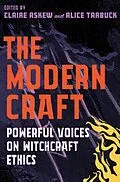Galvanizing and electrifying glimpses from the brink of the contemporary Craft
This eclectic collection of essays on responsible witchcraft is a fascinating snapshot of contemporary occult practice. Essay topics include the ethics of decolonization, meditations on what it means to honour Mother Earth during the Anthropocene, the reclamation of agency for working-class and queer witches through practical spellwork, a gender-fluid perspective on breaking down traditional hierarchies in magical symbolism, a day in the life of a disabled Pagan Irish practitioner, and so much more.
These essays show how we can all find inspiration and a force for powerful change in the modern Craft.
Featuring contributions from: Claire Askew, Lisa Marie Basile, Stella Hervey Birrell, Jane Claire Bradley, Madelyn Burnhope, Lilith Dorsey, AW Earl, Harry Josephine Giles, Simone Kotva, Iona Lee, Briana Pegado, Megan Rudden, Sabrina Scott, Em Still and Alice Tarbuck
Autorentext
Dr Alice Tarbuck is a writer, author of A Spell In The Wild, and academic specializing in witchcraft and environmental humanities. Her work on witchcraft has been featured in Nasty Women and The Dangerous Women Project, and she has spoken on witchcraft at Scottish PEN, Freedom TV and the Arthur Conan Doyle Centre.
Dr Claire Askew is the author of three novels: All The Hidden Truths, What You Pay For and Cover Your Tracks. A fourth, A Matter of Time, is out this year. Also a poet, Claire's second collection How to burn a woman, publishing this year, features voices from the European Witchcraft Hysteria. Claire's accolades include the Lucy Cavendish Fiction Prize, a Jessie Kesson Fellowship, and the McIlvanney Debut Prize.
Klappentext
An eclectic and radical collection of essays on contemporary witchcraft and the ethics of magic - a must-read for anyone engaged with the occult, witchcraft or magics of any kind.
In a world that often feels like it makes no sense, many people have begun to reach out to the numinous for a sense of understanding and connection.
Looking back to ancient wisdom, folklore and classic texts for answers can be helpful, but sometimes without the context of the contemporary it can be hard to see how these old ways apply to the here and now. Too often, depictions of witches - and indeed some contemporary witchcraft practices - perpetuate harmful racist, colonialist and culturally appropriative narratives. Gender essentialism crops up often in witchcraft circles, and #witchgoals trends proliferated by large companies and mass media raises troubling questions about the relationship between witchcraft and capitalism.
Toil and Trouble is an eclectic and radical collection of essays on witchcraft practice and the ethics of magic, which gives that much-needed modern context to timeless wisdom. This is a fascinating snapshot of contemporary occult practice viewed through an intersectional lens. Essays include poets on the magic inherent in language, working-class witches on the reclamation of agency through practical spellwork, and gender fluid practitioners on the necessity of breaking down traditional hierarchies in magical symbolism. Poetic, inspiring and electrifying glimpses from the brink of contemporary craft, these essays show how anyone, no matter where they live or who they are, can find positivity and the force for powerful change in the subversive unknown.
